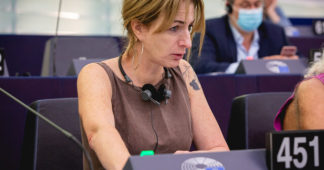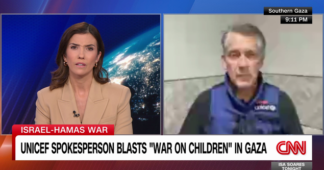“Pressure is necessary to change the situation,” top EU diplomat Kaja Kallas said.
The EU will review its political and economic agreement between Israel and the European Union over the “catastrophic” situation in Gaza, Kaja Kallas said Tuesday.
Israel has for weeks blocked aid from entering the besieged strip, before allowing in a small amount in the past few days, which is yet to be distributed. The UN warned earlier on Tuesday of imminent mass starvation, sounding the alarm that 14,000 babies are at risk of dying in the next 48 hours.
“The situation in Gaza is catastrophic,” said Kallas, the EU’s top diplomat. “The aid that Israel has allowed in is of course welcomed, but it’s a drop in the ocean. Aid must flow immediately without obstruction and at scale because this is what is needed.”
“I’ve made these points also with my talks with Israelis,” she continued. “Also I’ve had talks with UN and the regional leaders as well. Pressure is necessary to change the situation.”
The foreign ministers of numerous EU countries voiced support for a Dutch-led initiative to review the agreement — a move that Dutch Foreign Minister Caspar Veldkamp launched last week in a letter to Kallas, the EU’s top diplomat, as first reported by POLITICO.
The EU-Israel Association Agreement entered into force in 2000 and covers topics ranging from the framework for political dialogue to agriculture and the free exchange of goods. Any EU review based on concerns about rights would send a strong diplomatic signal.
“The Netherlands took the initiative because we have grave concerns about Gaza,” said Veldkamp. “We are grateful that enough Member States support this step and that the High Representative Kaja Kallas has decided to initiate the review of Art 2.”
“This is an important European signal that the Israeli government needs to fully lift the humanitarian blockade,” he said. “Meanwhile, we need to keep working towards a ceasefire, to get the hostages released, humanitarian aid to those in need and bring an end to this terrible war.”
Kallas’s tone has shifted since last week when she said that such an initiative is unlikely to succeed given uneven political support inside the EU to apply more pressure to Israel.
Criticism of Israel has grown louder since the letter was sent, and its military onslaught and blockade on Gaza has killed hundreds more Palestinians over the weekend. The leaders of France, the U.K. and Canada all decried what they called “intolerable” suffering in Gaza.
Marc Botenga MEP, The Left Group’s coordinator on the European Parliament’s Committee on Foreign Affairs, welcomed the review of the Israel-EU agreement, but added: “Israel is still receiving arms and public funds from Europe. This full complicity with genocide and ethnic cleansing is outrageous. We need a total arms embargo against Israel now and an immediate cancellation of the EU-Israel Association Agreement.”
Britain on Tuesday halted negotiations on a free trade agreement with Israel.
Israel began its most recent military campaign Gaza in October 2023 after the armed group Hamas took hostages during an attack on an Israeli music festival which led to the deaths of over 1,200 people. The ensuing Israeli operation has laid waste to much of the strip’s housing and crucial infrastructure and killed more than 55,000 Palestinians, according to local authorities.
A May 12 report by the UN-backed Integrated Food Security Phase Classification found that Gaza is at critical risk of famine, with over 93 percent of the population facing crisis levels of food insecurity. The IPC wrote that with the expansion of Israel’s military operations in Gaza the risk of famine “is not just possible – it is increasingly likely.” Health authorities in Gaza say that Israel killed at least 55 people on Tuesday and over 500 in the last eight days.
Gabriel Gavin, Joe Stanley-Smith and Sasha Schroeder contributed reporting.
We remind our readers that publication of articles on our site does not mean that we agree with what is written. Our policy is to publish anything which we consider of interest, so as to assist our readers in forming their opinions. Sometimes we even publish articles with which we totally disagree, since we believe it is important for our readers to be informed on as wide a spectrum of views as possible.











